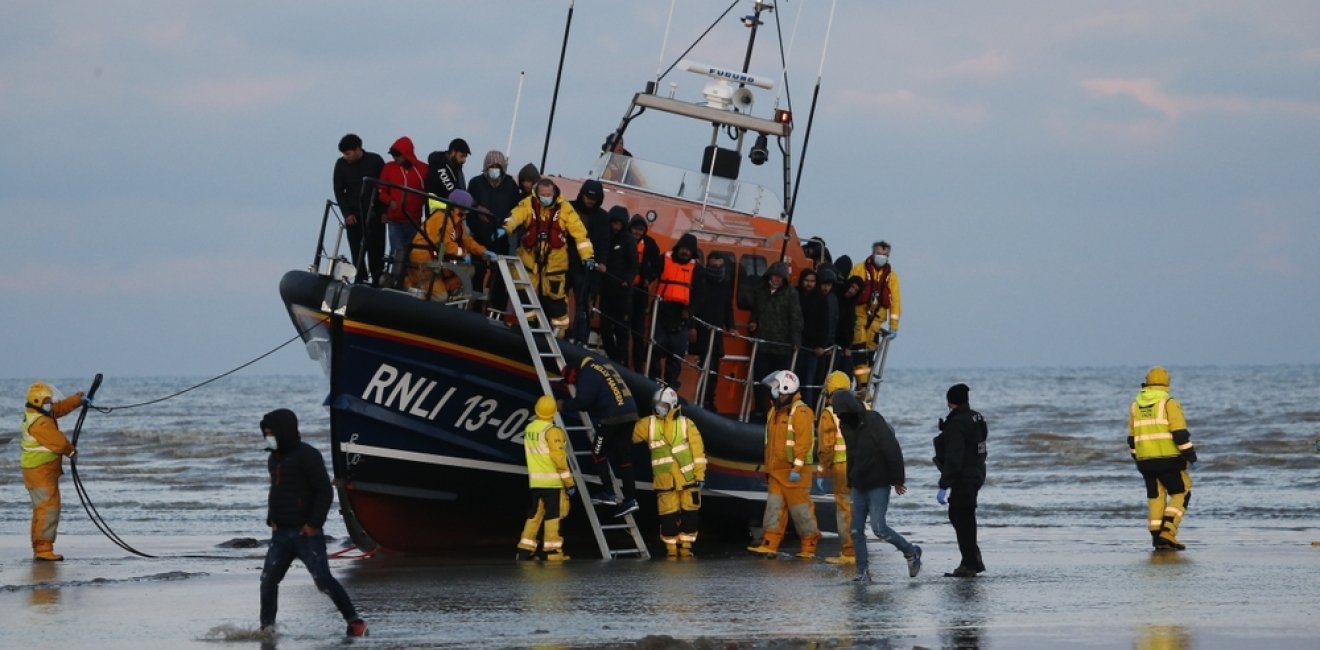Several European governments are considering the offshoring of illegal immigrants, including the British government. Can it be undertaken without breaking international and domestic law? Is it an effective answer to calls to curb illegal migration? The Israeli’s tested offshoring in 2013 when they sent illegal migrants to Rwanda. Five years later, they closed the program because Rwanda failed to observe the terms of the agreement. Italy has announced a plan to offshore migrant processing centers to Albania, Germany has tightened its borders and Denmark has signed an agreement, similar to that in the United Kingdom (UK) to send illegal migrants to Rwanda. As the UK’s Rwanda bill approaches its final stage in the legislative process, will it solve the problem it sets out to or set a dangerous precedent for the rest of Europe?
Illegal immigration is one of five key concerns to the British electorate. The UK’s Office for National Statistics reported net migration was 672,000 between 2022 and June 2023, slightly up from 607,000 over the same period a year earlier. Among these total numbers, most of whom arrive at ports of entry, asylum seekers arriving in small boats – rubber dinghies and kayaks - across the English Channel have alarmed UK citizens. According to the Migration Observatory latest report, 46,000 people were detected crossing the channel in small boats in 2022 and in the first half of 2023 the number was approximately 11,500, a decline of 10 percent compared to the first half of 2022. Historically, numbers rise in the second half of the year due to better weather. The flood of illegal migrants coming ashore became intolerable due to the risk of drowning and has become a political flashpoint in the country.
In 2022, then-Prime Minister Boris Johnson proposed to offshore illegal immigrants to Rwanda. He entered a Migration and Economic Development Partnership (MEDP) with Rwandan President Kagame recorded in a Memorandum of Understanding and two diplomatic notes. However, both the United Nations and Human Rights Watch had reported on the Rwanda government’s systemic use of torture while in police custody, use of child soldiers, and repression of political opponents. Their evidence showed that Rwanda was not a safe country for those seeking asylum or protection, and the uproar in Britain was thunderous. Consequently, offshoring was put on a back burner.
Upon becoming Prime Minister in October 2022, Rishi Sunak declared that he would “stop the boats” by creating an effective deterrent policy.
Upon becoming Prime Minister in October 2022, Rishi Sunak declared that he would “stop the boats” by creating an effective deterrent policy. He would resurrect the controversial offshore to Rwanda policy. In the government’s opinion, this was the only deterrence which would effectively reduce illegal migration by cautioning both those who sought to cross the English Channel and those who overstayed their study or work visas. Sunak reached an agreement with French President Macron to reduce if not stop illegal cross Channel migration by beefing up patrols along the French coast and deploying both French and UK coast guards to turn the boats back to France. The agreement succeeded in reducing the number of Channel crossings by one-third. But that was still too many for a government facing strong opposition to its immigration policy as the 2024 general election approaches.
This remains a contentious issue in British politics and a focus of the Conservative government, which faces staunch opposition and pressure to deliver at the same time It was recently reported those who had arrived and sought asylum were housed in hotels at a cost of GBP 8 million per day, and the average wait for a court hearing was 48 weeks. Many asylum seekers never appeared at their court date. Critics claimed that their presence resulted in lower wages and foreigners taking British jobs. A September survey by Ipsos/British Future found that 79 percent of UK voters, including 74% of Conservative supporters believe that their government was doing a “bad job” on immigration.
The government proposed a number of measures to combat illegal immigration. They restricted visa rules by raising minimum salary requirements for foreign skilled workers (except for health and social workers), increasing in the annual immigration health surcharge, raising the minimum income for family visas, reducing employers’ capacity to sponsor visas, and appointing 150 additional immigration judges to hear the backlog of 600,000 asylum cases. However, none of these measures created a startling deterrence. Sunak therefore brushed up Johnson’s Rwanda offshore policy. It met immediate opposition from the European Court of Human Rights (ECHR) which declared the policy of sending asylum seekers to Rwanda was contrary to both EU and International law.
The bill was also challenged in the UK Court of Appeals and then in the UK Supreme Court where a unanimous decision on December 5 found that the bill was unlawful. It concluded “there are substantial grounds for believing that asylum seekers would face a real risk of ill-treatment by reason of refoulement to their country of origin if they were removed to Rwanda.” A panel of four judges concluded that Rwanda was neither safe, nor could it assure the British authorities that it would not force migrants to a neighboring country which would have no compunction about sending them back to the country from which they had earlier fled. Refoulement, or sending back to the abusing country, is forbidden under the International Refugee Convention of 1951.
To meet the legal problems, the Home Office redrafted much of the original bill which Sunak presented to the country on December 6 in legislation, named the Safety of Rwanda Asylum and Immigration bill. The amended legislation commits the Rwandan government to send ‘Relocated Individuals’ only back to the UK, and nowhere else. That met the Supreme Courts principal objection. The revised bill also states that Rwanda is safe despite the government's own publication, Human Rights and Democracy Report published in July 2023 which found serious abuses to those opposing President Kagame. Human Rights Watch also identified human rights abuses in Rwanda in its World Report 2024 published shortly after the Emergency Legislation on January 11, 2024. To ensure safety, a Monitoring Committee will be created, whose members shall be “persons independent of both Parties.” They shall ensure that the migrants are properly housed, receive medical attention and are safe. Furthermore, an enhanced Monitoring Committee will be established for the first three months from the date the migrants first arrive. A Joint Committee will also monitor and review the implementation of the agreement and make non-binding recommendations. Finally, asylum seekers will also be able to petition the UK government from Rwanda and have their petitions heard in a timely manner. These commitments should ensure that migrants from the UK are protected, and their legal rights are respected. The revisions met the legal objections to the original bill but create serious problems of implementation. Could the revised version effectively deter new migrants seeking to cross the English Channel?
Conservative MPs from the back benches were the first to criticize the revisions. Sixty of them threatened to rebel against the Prime Minister. They pointed out that individual asylum seekers could still seek an asylum hearing before UK judges prior to boarding the chartered flights to Rwanda. The critics anticipated that migrants would concoct a spurious physical or mental reason by which they could not be sent to Rwanda. If denied, they would still have the right of appeal. Furthermore Rule 39 of the ECHR offers the possibility to request suspension of removal orders. While the UK has left the European Union, it remains a member of the Council of Europe and therefore subject to the jurisdiction of the ECHR. The Conservative critics howled but, in the end, supported the bill in its third reading to avoid political disarray with a general election expected in 2024. Approved, the bill now goes to the House of Lords.
Other European governments considering offshoring illegal immigrants will watch closely to see how the UK government implements its Rwanda Safety & Immigration bill.
Offshoring migrants is controversial. Eight countries have offered to house illegal migrants, but only Rwanda offered to accept the UK’s proposal. Significant resources, the amount so far unpublished, have been given to Kagame’s government although no migrants have yet arrived. Kagame also has the right to send illegal migrants from Rwanda to the UK and several have already been sent.
The Lords will seek time to consider the legal, financial, and practical elements of this bill. The legal issues need to be examined to satisfy both domestic and international courts. The government needs to publish its estimated costs of sending thousands of migrants to Rwanda and housing them appropriately. What are the estimated costs of the Monitoring and Joint committees? What is the cost of returning migrants to the UK should UK judges decide that they have a valid claim? Finally, if costs are reasonable and the content of the bill is legal, is it feasible? Will migrant smugglers advise their customers to immediately seek asylum upon disembarking on English beaches? Will the goal of deterrence prove to be illusory and the economic cost far higher?
In order to meet the legal challenges, the government has created a bill that respects the law, but its practical outcome is questionable. Other European governments considering offshoring illegal immigrants will watch closely to see how the UK government implements its Rwanda Safety & Immigration bill. Does it create a real deterrence, and by what percentage does it reduce asylum seekers entering the UK? These questions will be raised not only in the House of Lords, but in European legislatures who are tempted to offshore thousands of men, women, and children seeking safety and a better life. This debate will continue to be vigorous and lengthy.
Author


Global Europe Program
The Global Europe Program is focused on Europe’s capabilities, and how it engages on critical global issues. We investigate European approaches to critical global issues. We examine Europe’s relations with Russia and Eurasia, China and the Indo-Pacific, the Middle East and Africa. Our initiatives include “Ukraine in Europe”—an examination of what it will take to make Ukraine’s European future a reality. But we also examine the role of NATO, the European Union and the OSCE, Europe’s energy security, transatlantic trade disputes, and challenges to democracy. The Global Europe Program’s staff, scholars-in-residence, and Global Fellows participate in seminars, policy study groups, and international conferences to provide analytical recommendations to policy makers and the media. Read more

Explore More
Browse Insights & Analysis
The OSCE is a Good Value for America

The Growing Transatlantic “Big Tech” Rift Explained

The Future of France's Far-Right Party



